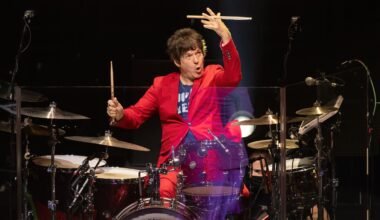No rock classic ever became legendary by doing the bare minimum.
Sure, there are countless power-pop bands trying to write the next great hook, but there’s always that one odd chord or sneaky shift in dynamics that turns a song into something you want to replay a thousand times.
Rush? Well, they’ve always been pros at keeping things weird, but even Geddy Lee had to admit that “7 and 7 Is” was one of the strangest hits to ever make the charts.
If you were checking out what the Canadian legends were putting out, you’d probably think they had an allergy to mainstream rock and roll.
Across their albums, they never chose the easy path—awkward time signatures, wild riffs, and runs that could break your fingers if you weren’t ready for them. And that’s Rush at their best—pushing the boundaries.
Sure, prog-rock was still going strong during their prime, but even among prog bands, Lee and the guys were diving into the deep end.
For a band that worshipped King Crimson and Genesis, even a song like “La Villa Strangiato” was a complete mind-bender.
But hold up—before the prog scene blew up, we had the trippy psychedelic movement.
There was the whole folk revolution, but acid rock and the Summer of Love opened the doors for bands like Yes to write their crazy long epics.
The Grateful Dead? They paved the way for more experimental sounds too.
“7 and 7 Is” doesn’t exactly fit into those sweeping epics, but its odd chords made it a standout pop hit.
With lyrics that sound like a trip down the rabbit hole—talking about staring at a bottle and wishing you were in a can—Arthur Lee went full-on Alice in Wonderland here.
The Beatles’ “I Am the Walrus” might have some serious competition for trippiest lyrics with this one.
It was weird, no doubt, but it was just strange enough for Rush to cover it on their EP Feedback.
As Geddy Lee put it: “One of the weirdest songs ever written. Pure surrealism. Alex and I loved this song when we were kids, especially the chord progression.
The lyric is probably the goofiest thing I’ve sung in my life; We had some fun with it.”
Of course, Rush playing around with surreal vibes wasn’t out of character.
The trippy sounds of the psychedelic scene definitely connected with Rush’s more elaborate pieces, like “Jacob’s Ladder” from Permanent Waves.
Because at the end of the day, progressive music wasn’t just about cramming scales together and calling it a song.
It was about pushing the limits. And in the late ‘60s, Geddy had to admit that Love really raised the bar with their surreal, mind-bending tunes.







